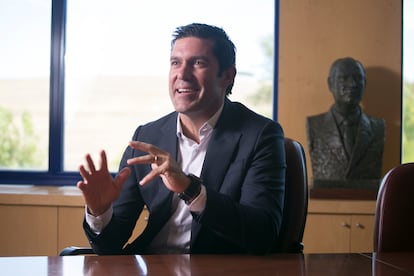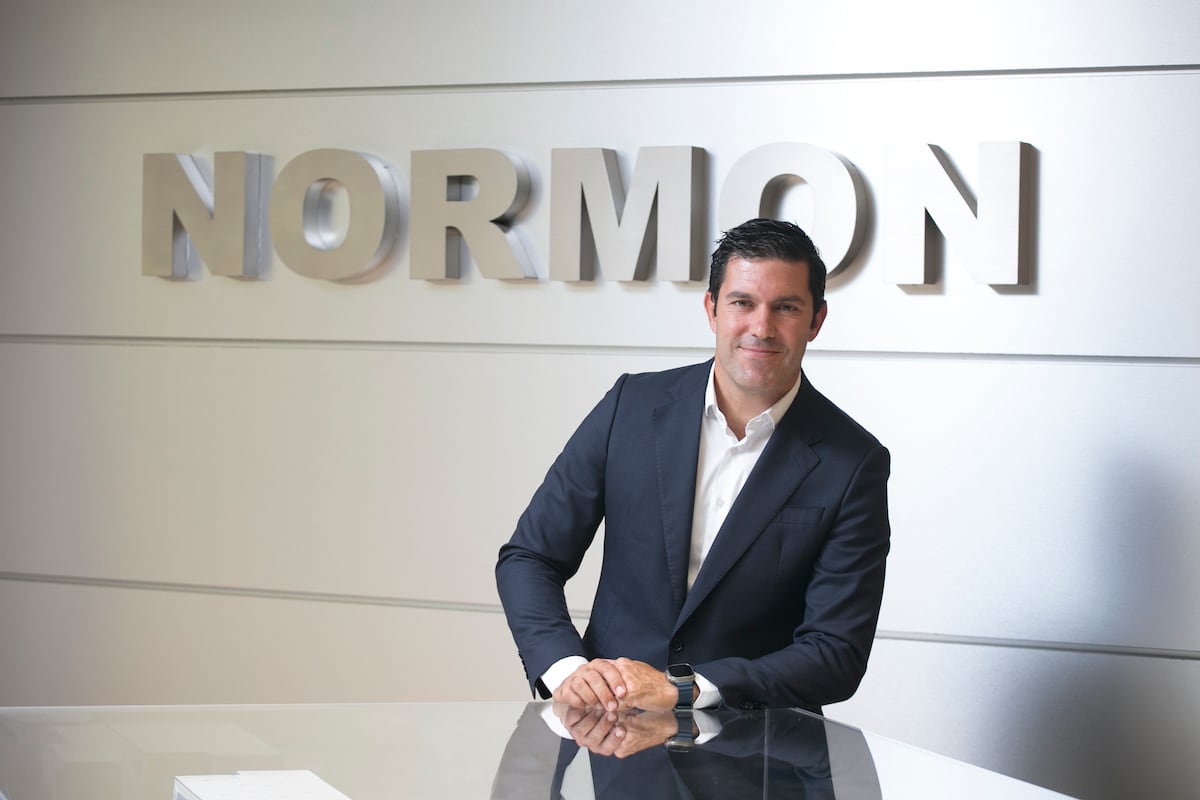The Normon family laboratory, focused on the generic medicines business and with more than 85 years of history, is in the process of succession. Jesus Govantes (Madrid, 1986), current deputy general director, who previously led the international area, will take the reins of the company next year.
A transition that coincides with an ambitious investment and workforce expansion plan to double its production capacity and grow in Spain and abroad. And with the launch this year of varenicline, a smoking cessation drug that Health has been financing for four months. Specifically, the presentations of 0.5 and 1 milligrams of 56 tablets (58.73 and 56.56 euros respectively) and that of 53 (54.37 euros).
Q. Since June, the health system has covered varenicline, its flagship generic for smoking cessation. What benefits does it entail?
R. Smoking is a chronic disease, according to the World Health Organization (WHO); Eight million people lose their lives due to this cause. We launched it in May. It is a much simpler medication, with a morning and evening dosage and a blister pack that easily identifies the doses. It is the drug of choice for doctors when prescribing, what happens is that it was not available [en 2021 se retiró del mercado el de marca, Champix, de Pfizer, después de que la Agencia Española del Medicamento informara de la presencia de nitrosaminas, un compuesto potencialmente cancerígeno]. The objective: to obtain a quality product that meets the strict specifications and regulatory needs.
Q. What does this requirement imply?
R. Our product, which we were able to successfully reformulate quickly, is below the permitted limit of nitrosamines and meets all the requirements demanded by the authorities.
Q. After therapy, does the person stop smoking?
R. It is a three-month treatment. The success rate is up to three times higher than other therapies. It is not only its consumption, it is also the change in habits that it produces in people who comply with the treatment. Its adverse effects, such as nausea and discomfort, are minor and it combines very well with cardiovascular, psychiatric and COPD therapies.
Q. What happens after those three months?
R. In principle, this dishabituation would have already arrived. You will also have to follow up with the doctor to see if it needs to be extended or not.
We expect to manufacture 370 million units this year, an increase of 10% annually
Q. It has been questioned whether Health finances this type of drugs or whether only one therapeutic alternative is included, what do you think?
R. According to the WHO, it is a disease. It is true that it is an accepted habit in society and that one decides to expose oneself to the consequences, but given the cost it has for the national health system, and the associated diseases, it is much better to finance anti-smoking treatment than to then treat all of them. its consequences without remedying this great problem and the diseases it generates. Regarding the second, it is good that there is diversity in treatments.
Q. The company continues with its investment plan and staff increase despite the adverse environment.
R. In the high-volume generic world, capabilities are essential. The growth is very intensive in capex to double the production of our Tres Cantos plant, with a modern distribution center, be competitive in costs and grow in Spain and abroad. Since 2019 we have invested 300 million euros. This year we hope to allocate 70 million and another 250 million until 2030. In addition, we want to incorporate 200 people; we are 3,100.
Q. You talk about doubling capacity, can you specify?
R. In 2023 we will manufacture 340 million units, almost 5,000 million doses, with an increase of 10% annually. Since we moved to Tres Cantos in 2006 our capacities have been increasing with investments to be able to have increases of 10%-15% year-on-year. We also hope to grow 10% this year and reach 370 million units.

Q. And the impact on income?
R. Last year we closed the year at around 420 million. The increase in the coming years will depend on the situations we find ourselves in Spain: we have a very unstable demand framework, not only due to supply capacity, but also due to regulatory changes. And see how our international expansion evolves.
Q. Where do you look outside?
R. We are in more than 90 countries. We have subsidiaries in Portugal and the USA, the latter is one of our great objectives. Last year we launched pantoprazole there [para la inflamación del esófago]. But our idea is to continue integrating ourselves into the markets we are in. We also manufacture a lot for third parties with others big players pharmaceutical, generic and non-generic.
Q. Are you contemplating going public?
R. No, we want to continue leading 100% of the capital.
There are no clear policies to promote the use of generics; its price is low. This affects companies, the system and the patient
Q. Name upcoming releases.
R. We are preparing to manufacture products that will expire on patent in the coming years, such as apixaban and rivaroxaban, anticoagulants. In self-care, another of our bets, we launched the Bensania line of food supplements and we are completing the different indications and symptoms. And in dental, we complete the portfolio of consumables (composites for cavities, suture material, disinfection and printing).
Q. Has the company considered manufacturing biosimilars?
R. We have analyzed many opportunities, but it is not the time yet.
Q. I was wondering why other laboratories are betting on biologics to gain profitability.
R. We have to invest a lot to be competitive. There are no clear policies to promote the use of generics. Practically, we are not able to gain penetration with the new launches due to their low price, from 30 years ago. The discretionary declines of some foreign companies, especially Asian ones, also affect us. In the long term, this means that no more enter, that there are no savings for the system and that there is a risk of shortages; we have to rethink the model.
